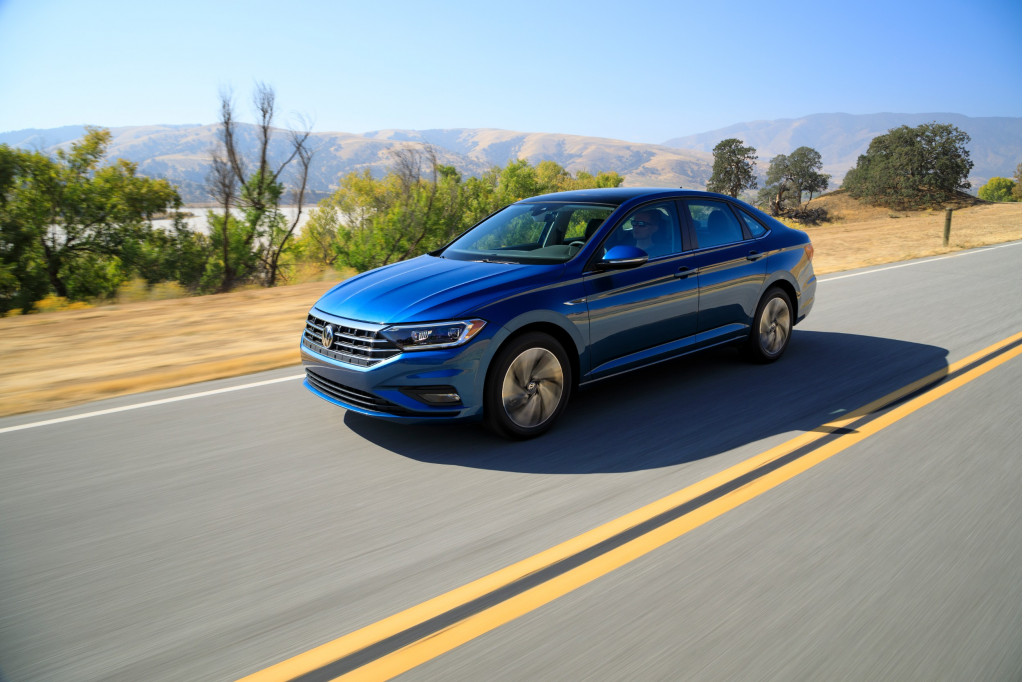Over the lifetime of a car, small things can make a big difference.
When it comes to fuel economy, just 1 or 2 mpg can add up to hundreds of dollars left in owners’ pockets.
That may not mean much to luxury buyers, but for compact sedans that start at less than $20,000 and their owners, every dime, dollar, and drop saved counts.

2019 Volkswagen Jetta
Our colleagues over at The Car Connection finished up their first drive review and reported that the compact sedan they tested returned 37 mpg in combined fuel economy, above the 34 mpg rating from the EPA calculators.
That’s good among compact sedans with which the Volkswagen Jetta competes, and relatively frugal compared to just a few years ago.
Only 10 years ago, a Jetta equipped with a 2.0-liter inline-4 was rated nearly 10 mpg lower on the combined cycle, a testament to increased efficiency, better aerodynamics, forced induction—all at a lower price.
DON'T MISS: How 2019 Volkswagen Jetta inched up its EPA fuel-economy ratings
By VW’s own measurements, the Jetta measures 108.8 cubic feet for interior volume (passenger room plus cargo space), which the EPA classifies as “compact.”
Most shoppers would place the Jetta squarely among bestselling competitors that include the Honda Civic, Chevrolet Cruze, Toyota Corolla, and Hyundai Elantra that all manage combined mileage around 30 mpg or higher—but there are some catches.
The Cruze can be fitted with a long-legged 1.6-liter turbodiesel that beats competitors with a 37 mpg combined rating from the EPA, but it costs $24,695 to start and may be out of reach for many small-car buyers. We’ll put that one aside. The rest of the Cruze range manages around 32 mpg combined.
CHECK OUT: Six things you should know about the new Volkswagen Jetta
Similarly, the most frugal Elantra is the Eco edition with a 1.4-liter turbo-4 and dual-clutch automatic. We have our quibbles with that car—especially its transmission—but its price isn’t one of them. It comes in at less than $20,000 to start. And the EPA fuel economy numbers beat the Jetta by one mpg (two in the city.)
Where’s the hold up? By Hyundai’s own calculators it’s not an EPA “compact,” the Elantra sedan measures 110.2 cubic feet inside and that’s a hair bigger than the threshold. Small technicality there.
The Corolla is aged, but its fuel-economy ratings aren’t. Most Corolla trim levels manage 30 to 31 mpg combined, according to the EPA. A frugal Corolla LE Eco edition uses different wheels and valve timing to wring every mile from a gallon of gas, it’s rated at 34 mpg.
2019 Volkswagen Jetta
Which leaves us to the Civic and its superlative 35 mpg combined rating in most configurations with a 1.5-liter turbo-4. Our repeated drives have consistently returned those numbers—or better—in everyday conditions, at any altitude, without much fuss. There’s better news: Most of our editors have reported better than 35 mpg combined in several drives of the Civic. The bad news? Like the Elantra, the Civic’s size creep puts it into mid-size territory with more than 110 cubic feet of interior space.
That leaves the Jetta as one of the most frugal compact sedans for less than $20,000 to start and sold without a plug. That’s impressive.
More impressive? How automakers have made small, affordable cars more fuel efficient in the past few years, a trend that should continue.













